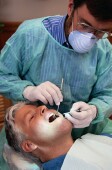
TUESDAY, Sept. 1, 2015 (HealthDay News) — Don’t be surprised if your next dental checkup includes questions about illicit drug use.
A new survey has found that more than three out of every four U.S. dentists ask their patients about illegal drug use.
The poll also found that more than half of dentists believe they should conduct drug screening of new patients.
More than 1,200 dentists nationwide responded to the survey. The researchers found that dentists who believed it was their role to conduct such screenings were much more likely to do so than dentists who didn’t think it was their responsibility.
Why should dentists conduct these screenings?
One reason is that illegal drug use can cause significant dental problems, such as tooth decay, accelerated tooth wear, gum disease and tooth loss, the researchers noted. Another reason is that dentists are the second-largest group of prescribers of powerful narcotic pain medicines called opioids, such as hydrocodone (Vicodin) and oxycodone (OxyContin, Percocet).
“Because dental care routinely involves treating pain and emergencies, dentists may encounter substance-seeking patients who complain of pain more severe than anticipated based on the nature of their dental condition, who report lost prescriptions for opioid pain medications, or who only seek dental treatment sporadically,” lead author Carrigan Parish, an associate research scientist from Columbia University Mailman School of Public Health in New York City, said in a university news release.
The survey found that older dentists were less likely to screen for drug use. Dentists younger than 53 were more likely than older dentists to believe that it was their role to conduct drug screening, 62 percent vs. 47 percent, the study noted.
Female respondents were more likely than males to agree that dentists should screen for illegal drug use, the findings revealed.
Survey results were published online recently in the journal Addiction.
“There are a sizeable number of people whose visit to a dentist represents their sole interaction with the health care system, highlighting the significance of the dental visit as a key opportunity to identify substance use disorders,” Parish said.
“However, our findings underscore a significant barrier in dentists’ attitudes that may limit the potential of the dental venue to play a role in screening for substance misuse,” Parish added.
Parish also said some dentists may require extra training to increase their awareness and knowledge of substance abuse.
What isn’t clear from this study is how dental patients might feel about these screenings.
“While surveys have shown that patients are amenable to receiving medical screenings by dentists ‘chair-side’ for such conditions as HIV, heart disease, and diabetes, further studies directly addressing patient attitudes on substance misuse screening are key in determining patients’ acceptance of such services,” Parish said.
More information
The U.S. National Institute on Drug Abuse has more about drug abuse and addiction.
Copyright © 2026 HealthDay. All rights reserved.

